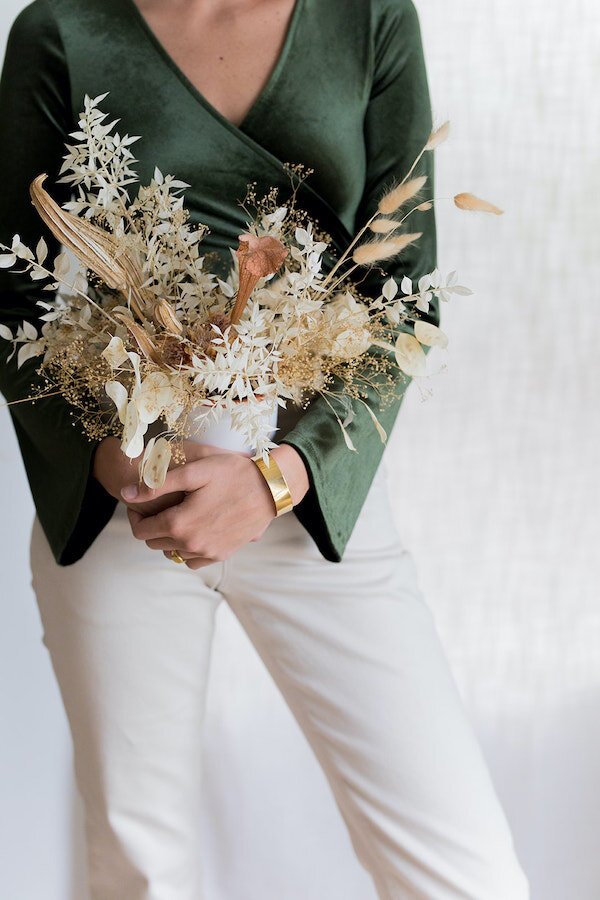
How I’ve Made Peace With My Period
The strongest memories I have of my period are associated with shame.
My first period happened when my mom was out of town. The thought of telling my dad was too humiliating to bear, so I frantically called her cell phone from the bathroom, where she led me to a box of pads and congratulated me—a sentiment I now find sweet but, at the time, made me want to melt into a puddle and slip through the floorboards.
“I noticed blood trickling down my inner thigh and bolted out of the library to the parking lot, praying that no one noticed and cursing my body.”
Another memory is from my high school days. I was wearing a short skirt and sitting in the library, while working on a research project. I noticed blood trickling down my inner thigh and bolted out of the library to the parking lot, praying that no one noticed and cursing my body.
For a long time, my period has been nothing more than cause for relief. This has often been short-lived and quickly turned to annoyance. It wasn’t until more recently that I began thinking about menstruation outside of my weeklong lifecycle every month.
Some decade after the high school library incident, I surprised myself by applying for a job at Cora, a company focused on period health and equity. A friend sent over the application, saying the role sounded like a fit, but what captured my attention was the company’s mission. Around the world, millions of girls are forced to skip school because they have inadequate access to period products. Cora helps with this by providing period products and health education to girls in need.
“The idea that something as biological as menstruation was contributing to girls missing school astounded me.”
I thought about that day when I sprinted from the library in high school—I took a shower at home, grabbed a handful of tampons, and was back on campus by fourth period. The idea that something as biological as menstruation was contributing to girls missing school astounded me. It’s even more disheartening when you begin to consider the long-term implications of missed school on education and career—and thus gender equality in the workplace, national productivity, and the long-term global implications of both.
I was thrilled to accept the job and work for a cause I believed in. What I didn’t realize was how much working at a “tampon company” would change my relationship with my own menstrual cycle.
Embracing Each Phase Of My Cycle
My relationship with my period has changed in a few ways, and it started with a mindset shift.
“I now acknowledge that my period is more than a five-day bleed; it is part of a cycle, and each of the four phases has something to teach me about my body and overall health.”
I now acknowledge that my period is more than a five-day bleed; it is part of a cycle, and each of the four phases has something to teach me about my body and overall health. I now diligently track my period and understand what each phase means, and more specifically, what it means for me—ovulation often gives me my most productive, energetic days of the month, while, like clockwork, I feel sad and moody around cycle day 27.
Understanding the cycle and its associated hormonal ebbs and flows has removed a lot of guesswork and guilt from the experience. Estrogen and progesterone both drop in the luteal phase right before menstruation, so it makes sense that one may experience tender feelings or sadness with this hormone depletion.
On a day when I feel particularly blue, it’s been hugely comforting and validating to look at my app and see that my period is fast approaching. I’ve begun to look forward to my period, knowing I may be in a bit of pain but that my only responsibility is curling up with that hot water bottle and reading a novel or watching Netflix. By learning to anticipate those duvet days rather than react with shock and dread, my period has become a protected part of my self-care routine.
“Planning my life according to my body’s data feels like bio-hacking a superpower.”
And planning my life according to my body’s data feels like bio-hacking a superpower. Pre-pandemic, I knew when to schedule group dinners that would require a lot of energy and attention. And I politely declined networking events if I knew it’d fall on the first day of my period, when I was likely to be on the couch with a heating pad. It’s easier now working from home, but I still try and limit my activity based on where I’m at in my cycle.
While physically, I’ve stopped fighting my period pain and allowed myself to surrender to the couch cushions, the mental shift in making peace with my period is even more helpful. In the most literal sense, menstruation is the shedding of the uterine lining, creating a fresh start for a new cycle. And reflecting on what I can metaphorically shed from the past month, what kind of fresh start I want to establish for myself in a new cycle, helps give my period another purpose.
And though we should all feel we can reset, reflect, and rest at any point for any reason, in my busiest weeks and months, I enjoy knowing that a good journal session and full day in PJs awaits me. Of course, this is easier now while working from home and wasn’t always entirely possible pre-pandemic (and still may not be for many people).
“Ultimately, making peace with my period has been about releasing shame and embracing the opportunity for ritual and connection to my body.”
Still, small shifts like not scheduling anything social for before or after work, enjoying a quiet lunch alone in the park, going to bed early, etc., can make a big difference. And if these ideas still feel unattainable, maybe it’s five minutes of meditation before getting the kids up or indulging in take-out—whatever your schedule looks like, ask yourself where there may be time to be gentler, kinder with yourself during your period. Ultimately, making peace with my period has been about releasing shame and embracing the opportunity for ritual and connection to my body.
It should also be said that it’s easier to make peace with your period if menstruation is relatively peaceful on your body. For those who suffer from PCOS, endometriosis, PMDD, or any other condition that exacerbates period pain, the process can be more difficult. Offering patience and kindness to myself has been the cornerstone of my own peacemaking process.
I’d encourage you to think through what that might look like for you (baby steps!), as well as what feels realistic given the circumstances of your unique cycle and lifestyle. Saying no, asking for help, or blocking “do not schedule” time on your work calendar are all ways you might begin to shift this time from an experience you may associate with pain and stress to a week you can reclaim for slowing down and healing.
While making peace with my period has been a wonderful byproduct of the work I’ve done these past three years, the issue that initially drew me to it is still very prevalent. But to overcome period inequity, we must first make the topic less taboo. I firmly believe that if more menstruators could make peace with their own periods (no matter how or when their periods show up), we could begin having more open, frequent discussions about menstrual care. Likewise, we could ensure products and education are available to menstruators everywhere.
But as with most narrative and institutional changes we wish to see on a large scale, we often must start with ourselves.
“But as with most narrative and institutional changes we wish to see on a large scale, we often must start with ourselves.”
RELATED READING
Megan Lierley is a writer and editor based in Northern California. She currently leads content for Cora, the women’s wellness company. On any given day, there’s a good chance she’s talking tampons, practicing yoga, writing her weekly culture and current events newsletter, reading a historical fiction novel, or eating a burrito in Dolores Park.
